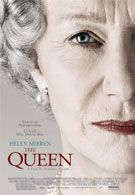With The Queen, British director Stephen Frears sheds light on one of England's most misunderstood public figures. The film, set during the week after Princess Di's death in 1997, offers a glimpse into what might have happened behind palace doors, when Queen Elizabeth II was caught between a relentless media frenzy and the desire to protect the royal family.
The death of Diana, affectionately referred to as "the people's princess," shook up the country and left legions of grieving fans desperate for someone to blame—the paparazzi came under fire for chasing her before the fatal car accident, and, shortly after, their rage shifted onto the Queen for keeping her grief silent and undetectable. In other words, they wanted their Head of State to radiate a bit more warmth than the nearest refrigerator.
The Queen begins with Her Majesty (played with understated perfection by Helen Mirren) discussing politics with the man painting her portrait. The opening credits pop up as she is gazing off to the side, and then, unexpectedly, she stares fearlessly into the camera. It's a perfect introduction to how the movie plays out: honestly, straight-forwardly, and without any sugarcoating.
When Tony Blair (Michael Sheen) is elected Prime Minister, his friendly demeanor ("call me Tony") contrasts with the icy exterior of the Queen. Their first meeting, awkward and abrupt, hints that they have different ways of doing business—and their contained oil-and-vinegar dynamic resurfaces following Di's death. The Queen insists on keeping the matter private and dignified; meanwhile, slanderous tabloid headlines hit the newsstands and a nasty backlash emerges, with 1 in 4 people feeling the monarchy should be discarded like expired milk. But it's not that the Queen doesn't care—it's that she is practicing politics the way it's always been done. If times are changing, should tradition change with it?
What makes The Queen a fascinating, successful docudrama is that it doesn't play favorites or choose sides. Frears (Dirty Pretty Things) and writer Peter Morgan (The Last King of Scotland) have created a fair-minded interpretation of events, finding the real person behind the permanent sourpuss expression. Mirren shines the brightest when she is caught in subtle, fleeting moments—admiring a beautiful wild animal, briefly sobbing with her back facing the camera—and although she is a tad uptight, she's not without a sense of humor.
The same is true for the movie: the monarchy may have a stuffy vibe, but the film provides a good sum of laughs, both outright (Prince Philip, played by James Cromwell, snaps that the funeral guest list reads like "a chorus line of soap stars and homosexuals") and uncomfortable ("[Diana] manages to be more annoying dead than alive.")
While Mirren is getting the bulk of the attention, The Queen has a lot of elements that make it irresistibly regal. The script offers a well-rounded character study, the direction is flawless, and the rest of the cast, including Michael Sheen as an affable Tony Blair, all make the film a surprising delight. Unlike the shallow, 2 hour music video that is Marie Antoinette, Frear's latest is a film truly fit for a Queen.
Most Popular




